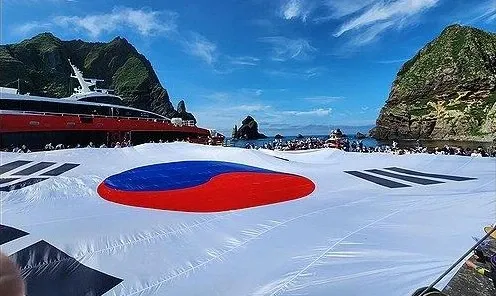Why is South Korea Protesting Japan's Claim to Dokdo?

Synopsis
Key Takeaways
- South Korea protests Japan's claim to the Dokdo islets.
- Japan's defense white paper reaffirms its position on the islets.
- Both nations have historical claims to the territory.
- South Korea maintains effective control over Dokdo.
- The dispute continues to cause diplomatic tensions.
Seoul, July 15 (NationPress) The South Korean government has issued a strong protest after Japan once again asserted its territorial claim to the Dokdo islets in this year's defense white paper, summoning officials from the Japanese Embassy to express their discontent.
The spokesperson for South Korea's foreign ministry stated, "The government is firmly against Japan's unjust claim to Dokdo," emphasizing that the islets are recognized as South Korean territory based on historical, geographical, and international law.
They further demanded an immediate withdrawal of Japan's claim, warning that the South Korean government would respond decisively to any provocations concerning Dokdo.
The defense ministry echoed these sentiments, pledging a stern response to any actions that may threaten the nation's territorial integrity.
Officials from the Japanese Embassy in Seoul were called in to receive complaints, according to a report by the Yonhap news agency.
The foreign ministry summoned Yoshiyasu Iseki, the acting minister of the embassy, to formally protest, while the defense ministry called in the embassy's defense attaché.
Additionally, the foreign ministry expressed concerns over the renewed territorial claim and the publication of a children's edition of the defense white paper, which also asserts Japan's sovereignty over Dokdo.
This children's version of the defense white paper, previously available only online since 2021, was printed and distributed to elementary schools for the first time this year.
Following a Cabinet meeting earlier in the day, the Japanese government published its annual defense white paper, referring to Dokdo by its Japanese name, Takeshima, and asserting it as part of Japan's territory.
The white paper stated that the territorial disputes over the islets "remain unresolved," marking the 21st consecutive year the document has included Japan's claim to Dokdo.
The issue of Dokdo has long been a source of tension between Japan and South Korea, with Tokyo consistently reiterating its claims in policy documents, public statements, and educational materials.
South Korea, meanwhile, maintains a small police presence on the islets, ensuring effective control over them.










